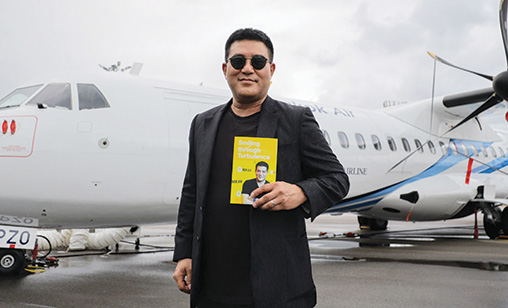News Feature
Liberated from the politics of Thai aviation
Former chief executive of Thailand’s Nok Air, Patee Sarasin, has written a “tell all” book about his time in the airline business and his turbulent relationship with the LCC’s majority owner, Thai Airways International. He spoke to associate editor and chief correspondent, Tom Ballantyne, in Singapore.
March 1st 2020
There is one question former Nok Air CEO, Patee Sarasin, answers without a moment of hesitation. Read More » Would he ever run an airline again? “Definitely not. I had 14 years. Have been there and done that. I don’t want to run another airline,” he said.
“I don’t want to go backwards and start over. Do I miss it? Yes. But I don’t think missing it is enough to make me want to go back into it.”
 |
Now running a travel agency, Really Really Cool, that was launched 18 months ago and will soon go online, the colourful former Nok Air boss has written a book, Smiling Through Turbulence, which charts his time at the carrier.
In the autobiography, Patee lays bare his sometimes controversial airline career, including his frequently shaky relationship with the management of the LCC’s majority owner, Thai Airways International (THAI).
“In the first 12 months, I would say Nok Air had a good working relationship with THAI. Sadly, the situation changed to the point of a breakdown in communication between the two sides,” he told Orient Aviation last month.
“Thai Airways’ top management kept changing due to politics. The flag carrier is a publicly listed company, but it is majority-owned by Thailand’s ministry of finance. The volatile political landscape in Thailand – namely successive changes in government, some due to military coups – flowed through to the national carrier. There were changes of chairpersons and presidents in quick succession.”
Patee said each THAI leader had a different view about Nok Air and the LCC business. “These new people never had a channel to properly understand what Nok Air was about. Their views were shaped by what they read in the newspapers,“ he said.
“The media preferred to write that low-cost carriers such as Nok Air were a competitive threat to legacy airlines such as THAI. Because of this perception, created by the news media, people at Thai Airways, including the new chairpersons and incoming presidents, started to view us as competition.”
He said for two separate parties to work well together there needs to be a shared vision between managements from both sides and they need to communicate and continually reinforce that shared vision.
“If you look at successful low-cost airlines such as Qantas Airways Jetstar and Singapore Airlines Scoot, they get along with their airline parents. They also had senior people at the full-service carriers who came from their low-cost airlines.
“Qantas Airways CEO, Alan Joyce, was previously CEO of Jetstar. Campbell Wilson, Singapore Airlines senior vice president sales and marketing, was previously CEO of Scoot (last month he was reappointed by SIA to head Scoot for a second time.). Obviously, these senior people were looking out for the low-cost carrier in the larger airline organization.”
Born in Bangkok to a prominent political family and educated in the UK and the U.S., Patee co-founded Nok Air in 2004 and was CEO until he stepped down in September 2017. During that time, his challenges included industrial action by a small group of pilots in 2016 that attracted a storm of negative publicity. The offended pilots objected to the LCC’s introduction of more stringent auditing of cockpit crew qualifications.
Eight years earlier, Nok Air was on the brink of collapse in the months leading to the Global Financial Crisis, Patee said. Sky high fuel prices meant the Don Mueang-based carrier’s financials were spiraling out of control, he said. “We had been losing money in 2007 when crude oil prices were around $70 a barrel, but the higher fuel prices in 2008 exacerbated the problem,” he said.
“It reached the point in late 2008, as oil prices topped $140 a barrel, when we were on the brink of collapse. The airline was losing US$100,000 a day, which was a lot of money for a small privately-owned carrier.
“We only had cash to last a few more weeks. It was the collapse of Lehman Brothers in September 2008 and the ensuing global financial crisis that saved us because suddenly oil prices plummeted.”
| “One of the biggest mistakes we made was to meet with Rusdi Kirana, president director of Lion Air. I now look back on that period in my life and wonder to myself ‘why did we meet Rusdi?’ “We had known for quite some time Lion Air wanted to establish an airline in Thailand. “We thought Lion Air was going to come in a big way, then we started talking to them about the possibility of partnering. But talking to Lion proved to be a big mistake. Rather than partner with Nok Air, Lion established Thai Lion Air which came into the Thai domestic market and sparked a price war. Lion entered the Thai market not to take on Nok Air, but to compete against AirAsia. “Rusdi and AirAsia’s Tony Fernandes are rivals and sadly for Nok Air, we became collateral damage in a battle between the AirAsia Group and the Lion Air Group for market dominance in Southeast Asia.” Patee Sarasin, former Nok Air CEO |